|

Page 1 2
3 4 5
6 7 8
9 10
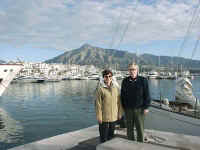
Us in Puerto Banus |
Sunday, 19 November. We got an early start since the bus left at 8:30 for the tour of
Ronda. The day was cool and overcast when we set out, but soon was sunny and pleasant. On
the way to Ronda, since we had to drive west along the coast before turning inland, we stopped at
Puerto Banus, which adjoins Marbella.. This is the Costa del Sol's principle marina for luxury
yachts. Back on the bus, we headed north into the mountains on a windy road. Looking south
toward the sea, we had frequent views of Gibralter in the distance. Finally we came to
Ronda.
Ronda is little known to most Americans. Even with my love of both geography and
ancient civilizations, I had never heard of it before planning this trip. The town stands on the top
of a plateau high in the mountains. This plateau is cut in two by a plunging river gorge (El Tajo).
The original town stood on the isolated southern section of the plateau, cut off from any adjacent
land. This made it impregnable to attacking armies until the advent of artillery.
The Romans built a bridge across the river more than 2000 years ago. It was not far
above the water, leaving a very steep climb to reach the town. The Arabs came to the area in the
8th century. In the 14th century they built a bridge (Puente Viejo) at a point higher up the cliff,
reducing the climb. That bridge is still there. In 1485 the Christians under King Ferdinand
captured the town from the Arabs. As the town grew in importance, the Puente Nuevo was built
in 1793, connecting the old and new sections of the town at street level.
Ronda is also famous for its Plaza de Toros, the first and oldest in Spain
(1784). It's located in the
"modern" (18th century) section north of the gorge. Both Ernest Hemingway and Orson Wells
loved Ronda and lived there for long periods. Wells' ashes were strewn in the Plaza de Toros, as
well as in other places around the town.
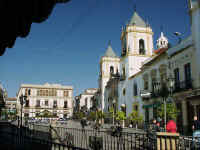
A plaza in Ronda |

Plaza de Toros |

Plaza de Toros |
On our arrival in Ronda, Angel led us several blocks from the bus to a corner next to the
Plaza de Toros where he turned us loose for an hour. Jane and I took a quick look at the Plaza de
Toros, then walked a block down the main street to the Puente Nuevo. The view was spectacular
in every direction. We could even see the 14th Century Puente Viejo (Old Bridge) far below.
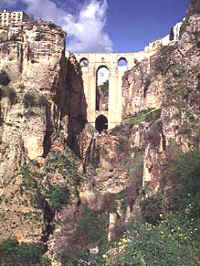
Puente Nuevo (1793) |
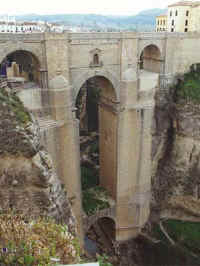
Puente Nuevo up close |
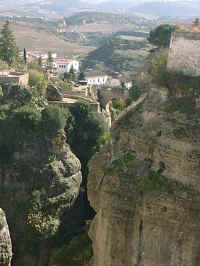
Puente Viejo (14th Century) |
After taking in the bridge and
the river gorge from every possible angle, we found a walkway starting at the gorge and leading
back to the Mirador (a gazebo jutting out over the steep cliff) behind the Plaza de Toros. There were colorful flower beds and a projecting
gazebo from which we enjoyed a great view of the valley far below.
We met the group at the nearby corner where Angel had left us, and he then led us on a
walking tour of the town. We crossed the Puente Nuevo into the old town and wound through the
narrow streets. We saw the monastery of Santa Maria la Mayor, whose elaborate bell tower was
once the minaret of a medieval mosque. We finally emerged through an old city gate and found
our bus waiting.
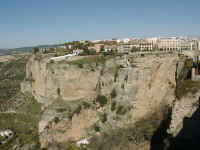
Ronda across El Tajo Gorge |
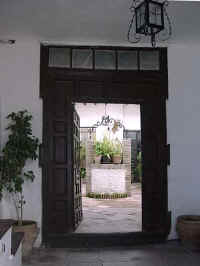
Courtyard of home |
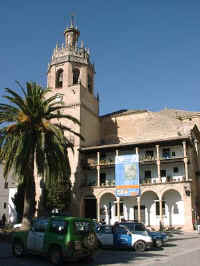
S. Maria la Mayor |
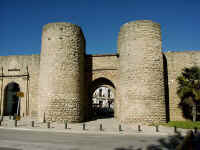
Ronda city gate |
The bus took us to a restaurant outside Ronda where we had lunch at 2:00 p.m.
Afterwards we took a different route back to Torremolinos, driving east though a scenic area filled
with citrus groves. By 4:30 we were back at our hotel. We spent a little time in the lounge before
having dinner at the hotel with Tom and Kyoko. Some of the tour groups must have left that day
because the restaurant was less than half full.
Page 1 2
3 4 5
6 7 8
9 10
|